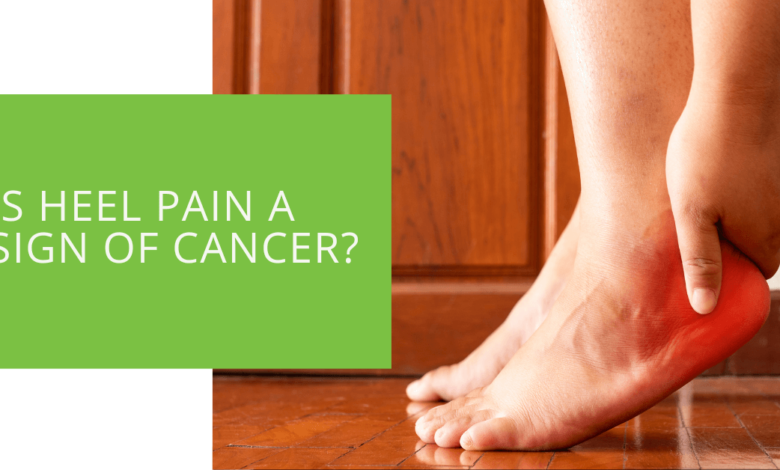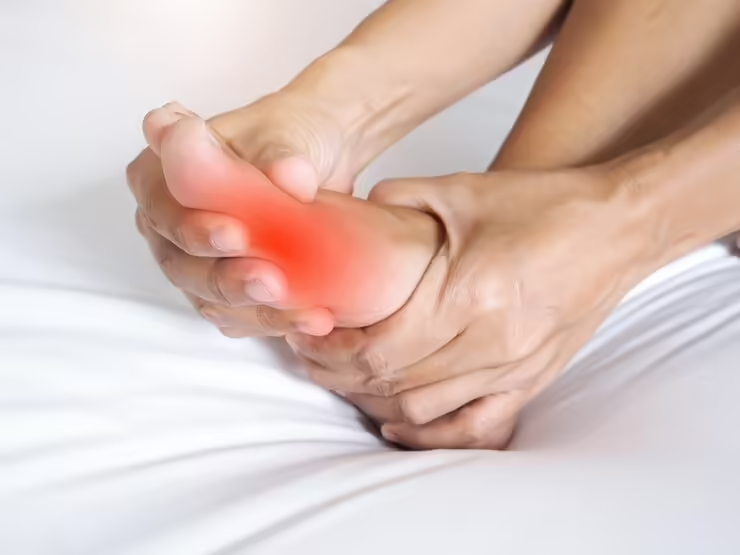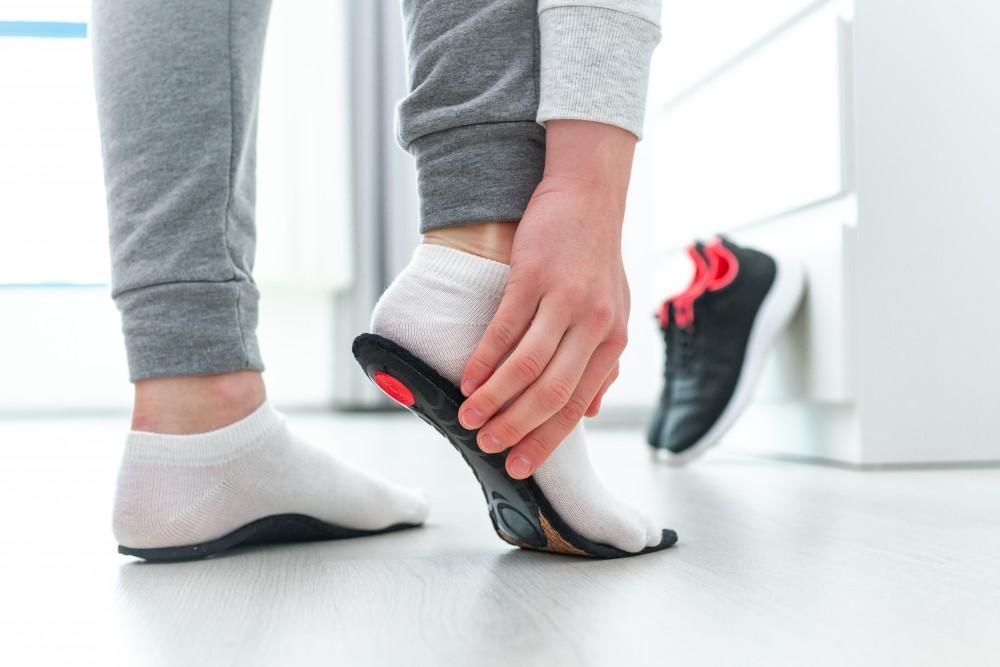Is Heel Pain a Sign of Cancer? What You Need to Know

Have you ever wondered, “Is heel pain a sign of cancer?” Many people experience heel pain at some point, but sometimes it can be more than just a common problem. In this blog post, we’ll explore whether heel pain could indicate a serious condition like cancer, and what signs to look out for.
Understanding Heel Pain and its Causes
Heel pain can be quite uncomfortable and often happens when you put weight on your feet. It can happen because of different reasons. Sometimes, it’s because of overusing your feet or wearing shoes that don’t fit well. Other times, it can be linked to more serious health issues like plantar fasciitis or Achilles tendinitis. These are common reasons for heel pain, especially in adults who are active in sports or have jobs where they stand a lot.
When we talk about heel pain and its causes, we need to understand that our heels are strong but can get hurt easily. Overuse, like standing for a long time or doing lots of running, can strain the tissues in our feet. This strain can lead to pain under the foot or at the back of the heel. Sometimes, if the pain doesn’t go away with rest or basic treatments, it might be a sign of something more serious, like cancer.
How Common is Heel Pain
Heel pain is more common than you might think. Many people experience it at some point in their lives, especially as they get older or if they are active in sports. It’s one of those things that can come and go, but if it persists or gets worse over time, it’s important to pay attention to it. In most cases, heel pain is linked to things like wearing the wrong shoes or doing too much activity without proper rest.
When we talk about how common heel pain is, it’s like saying a lot of people have felt it at least once. It’s not something to panic about right away, but if it sticks around or happens alongside other symptoms, it could be a sign of something more serious, like cancer. This is why understanding when to see a doctor and what to look for in your symptoms is crucial.
Is Cancer a Possible Cause of Heel Pain
While rare, cancer can sometimes cause heel pain. This happens when cancer cells spread to the bones in the feet, which can lead to discomfort or pain in the heels. It’s not the first thing doctors look for when you have heel pain, but it’s something they consider if other treatments don’t help or if the pain gets worse over time.
When we ask if cancer can cause heel pain, it’s like wondering if something serious could be hiding behind a common symptom. Cancer that spreads to the bones in the feet can be hard to detect early, but it’s important to know the signs. Things like persistent pain that doesn’t go away with rest, swelling, or changes in how your foot feels when you walk could be clues that something more than a simple injury is going on.

Real Cases: Cancer Presenting as is heel pain a sign of cancer
Sometimes, heel pain can be a sign of something serious, like cancer. is heel pain a sign of cancer There have been cases where people thought they had a common foot problem, only to find out later that it was actually cancer. This can happen when cancer cells spread to the bones in the feet, causing pain or discomfort that doesn’t get better with rest or typical treatments.
When we look at real cases where cancer presents as heel pain, it’s like seeing how tricky it can be to diagnose. Doctors might think it’s a common issue at first, like plantar fasciitis or a bone spur, but if the pain doesn’t go away or if other symptoms appear, they might do more tests. This is why it’s important to tell your doctor about any changes in your pain or if you notice new symptoms.
Symptoms of Cancer-related Heel Pain
Symptoms of cancer-related heel pain can vary, but they often include persistent pain that doesn’t go away with rest, swelling, or changes in how your foot feels when you walk. These symptoms can be subtle at first but may become more noticeable over time. It’s important to pay attention to any changes in your heel pain and discuss them with your doctor.
When we talk about symptoms of cancer-related heel pain, it’s like describing how your body might tell you something’s wrong. Cancer that spreads to the bones in the feet can cause pain that feels different from other types of heel pain. You might notice it getting worse or spreading to other parts of your foot. This is why it’s crucial to listen to your body and seek medical advice if you’re concerned.
When to See a Doctor About is heel pain a sign of cancer
Knowing when to see a doctor about heel pain is important. If your pain is severe, doesn’t go away with rest, or is accompanied by other symptoms like swelling or changes in how your foot feels, it’s time to get checked out. Your doctor can help determine the cause of your pain and recommend the right treatment.
When we talk about when to see a doctor about heel pain, it’s like knowing when to ask for help. If your pain is more than you can handle with over-the-counter treatments or if it keeps coming back, it might be a sign of something serious, like cancer.is heel pain a sign of cancer Getting checked out early can help you get the right treatment and feel better sooner.
Diagnosingis heel pain a sign of cancer: What to Expect
Diagnosing heel pain starts with a visit to your doctor. They will ask about your symptoms, examine your foot, and may order tests like X-rays or MRIs to get a closer look at the bones and tissues in your foot. This helps them rule out common causes of heel pain and identify any signs of more serious issues, like cancer.
When we talk about diagnosing heel pain, it’s like figuring out what’s causing your discomfort. Doctors use different tests to see inside your foot and check for things like fractures, inflammation, or even signs of cancer. This process helps them make the right diagnosis and recommend the best treatment for you.
Treatment Options for Cancer-related Heel Pain
Treatment options for cancer-related heel pain depend on several factors, including the type and stage of cancer, as well as your overall health. Options may include medications to manage pain and inflammation, radiation therapy to target cancer cells in the bones, is heel pain a sign of cancer or surgery to remove tumors or repair damaged tissue. Your doctor will work with you to develop a treatment plan that meets your needs.
When we talk about treatment options for cancer-related heel pain, it’s like discussing how to fight back against something serious. Cancer treatments can be tough, but they’re designed to help you feel better and improve your quality of life. Your doctor will explain what to expect and help you decide on the best way to move forward.
Prevention Tips: Keeping Your Heels Healthy
Preventing heel pain starts with taking care of your feet. This means wearing shoes that fit well and provide support, avoiding activities that strain your heels too much, and maintaining a healthy weight. Stretching exercises can also help keep your foot muscles flexible and reduce the risk of injuries that could lead to pain.
When we talk about prevention tips for keeping your heels healthy, it’s like giving your feet a little extra attention. By taking simple steps to protect your heels, like wearing the right shoes and staying active in a safe way, you can reduce the chances of developing pain or discomfort. This is especially important if you’ve had heel pain before or if you’re at risk for other foot problems.
Living with is heel pain a sign of cancer: Coping Strategies
Living with heel pain can be challenging, but there are ways to manage it and improve your quality of life. This includes using supportive footwear, practicing gentle stretching exercises, and taking medications as prescribed by your doctor. It’s also important to stay active within your comfort level and avoid activities that worsen your pain.
When we talk about living with heel pain and coping strategies, it’s like finding ways to make life easier despite discomfort. By learning how to manage your pain and make adjustments to your daily routine, you can still enjoy activities and stay active. is heel pain a sign of cancer Your doctor can help you find the right balance of treatments and lifestyle changes to help you feel better.

Research and Insights on Heel Pain and Cancer
Research on heel pain and its connection to cancer is ongoing. Scientists are studying how cancer cells can spread to the bones in the feet and cause pain. They’re also looking at new ways to diagnose and treat cancer-related heel pain early, which could improve outcomes for patients.
When we talk about research and insights on heel pain and cancer, it’s like exploring what scientists are learning about this topic. is heel pain a sign of cancer By understanding more about how cancer affects the feet and what signs to look for, doctors can diagnose it sooner and start treatment earlier. This research could lead to better care and more options for people with heel pain linked to cancer.
Hope and Recovery: Stories of Overcoming Heel Pain
Stories of people overcoming heel pain, whether from cancer or other causes, can inspire hope and show that recovery is possible. These stories highlight the importance of early detection, effective treatment, and support from healthcare providers and loved ones. They remind us that healing is a journey, and everyone’s experience is unique.
When we talk about hope and recovery from heel pain, it’s like sharing stories of resilience and strength. By hearing how others have faced challenges and come out stronger, we can find comfort and encouragement in our own journey. Whether it’s through medical treatments, lifestyle changes, or support from others, there are many ways to find relief and reclaim your quality of life.
Importance of Adequate Sleep in Heel Pain Relief
Getting enough sleep is crucial for overall health, including managing heel pain. When you sleep, your body repairs and rejuvenates itself, which can help reduce inflammation and promote healing in your heels. Aim for 7-9 hours of quality sleep each night to give your body the rest it needs. Creating a relaxing bedtime routine, like reading a book or taking a warm bath, can help you unwind and prepare for sleep. Remember, sleep is like recharging your batteries – it helps you wake up feeling refreshed and ready to take on the day!
The Role of Weight Management in Heel Pain
Maintaining a healthy weight is important for reducing pressure on your heels and preventing or alleviating heel pain. Carrying excess weight puts added strain on your feet, especially the heels, which can exacerbate pain and inflammation. Eating a balanced diet and staying active can help you achieve and maintain a healthy weight. If you’re struggling with weight management, consider consulting with a healthcare provider or nutritionist for personalized guidance and support. Think of weight management as finding the right balance – it helps you keep your heels happy and healthy!
How Lifestyle Changes Can Improve Heel Pain
Making positive lifestyle changes can have a significant impact on reducing heel pain and improving overall foot health. Incorporating regular exercise, such as walking or swimming, can strengthen muscles and improve circulation in your feet. Quitting smoking, if applicable, can also benefit your feet by improving blood flow and reducing inflammation. Additionally, practicing good foot hygiene, like wearing clean socks and shoes that fit well, can prevent conditions that may contribute to heel pain. Making small changes to your lifestyle is like taking steps toward a healthier, pain-free future!

The Benefits of Using Orthotic Inserts for Heel Pain
Orthotic inserts, also known as shoe inserts or orthotics, can provide support and cushioning to relieve heel pain and improve foot alignment. They can help distribute pressure more evenly across your feet and reduce strain on the heels. Orthotics come in various shapes and sizes, from off-the-shelf options to custom-made inserts tailored to your foot’s unique shape and needs. Consulting with a podiatrist or foot specialist can help you find the right orthotics for your condition. Think of orthotic inserts as giving your feet a supportive hug – they help you walk comfortably and with less pain!
Herbal Remedies and Supplements for Heel Pain Relief
Some herbal remedies and supplements may offer relief from heel pain by reducing inflammation and supporting overall foot health. Turmeric, known for its anti-inflammatory properties, can be taken as a supplement or added to food. Ginger, another natural anti-inflammatory, may also help alleviate pain when consumed regularly. Omega-3 fatty acids, found in fish oil supplements, can reduce inflammation throughout the body, including in the feet. Before trying any herbal remedies or supplements, consult with a healthcare provider to ensure they are safe and appropriate for you. Herbal remedies can be like nature’s helpers – they offer gentle support for your heels!
Conclusion
Heel pain can be bothersome, but with the right care and attention, you can find relief. Remember, it’s essential to listen to your body and take action when you feel discomfort in your heels. Whether it’s using supportive footwear, trying gentle exercises, or seeking advice from a healthcare professional, there are many ways to manage and alleviate heel pain. By making small changes to your lifestyle and staying proactive about your foot health, you can enjoy walking and playing without the worry of pain. Always remember, taking care of your feet is like taking care of a special part of your body that helps you move and explore the world around you.



